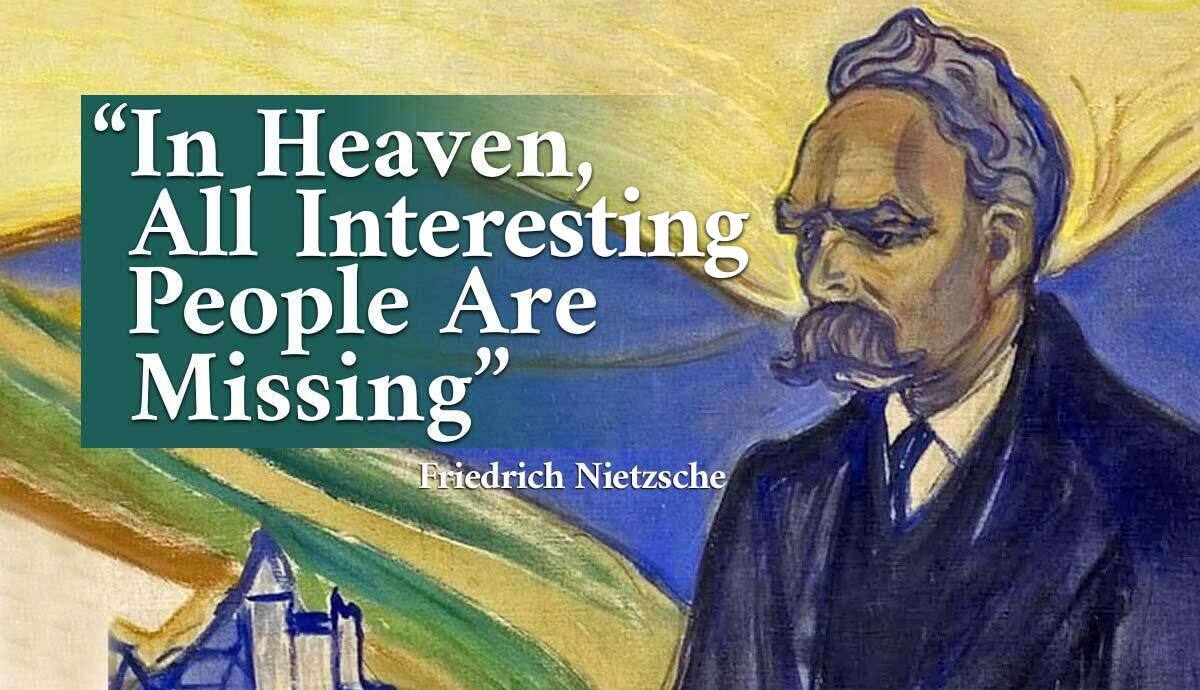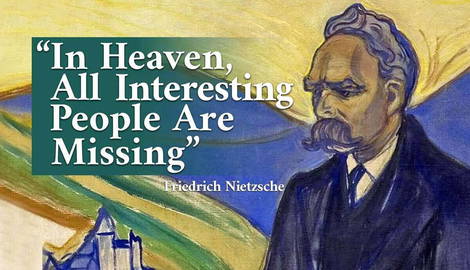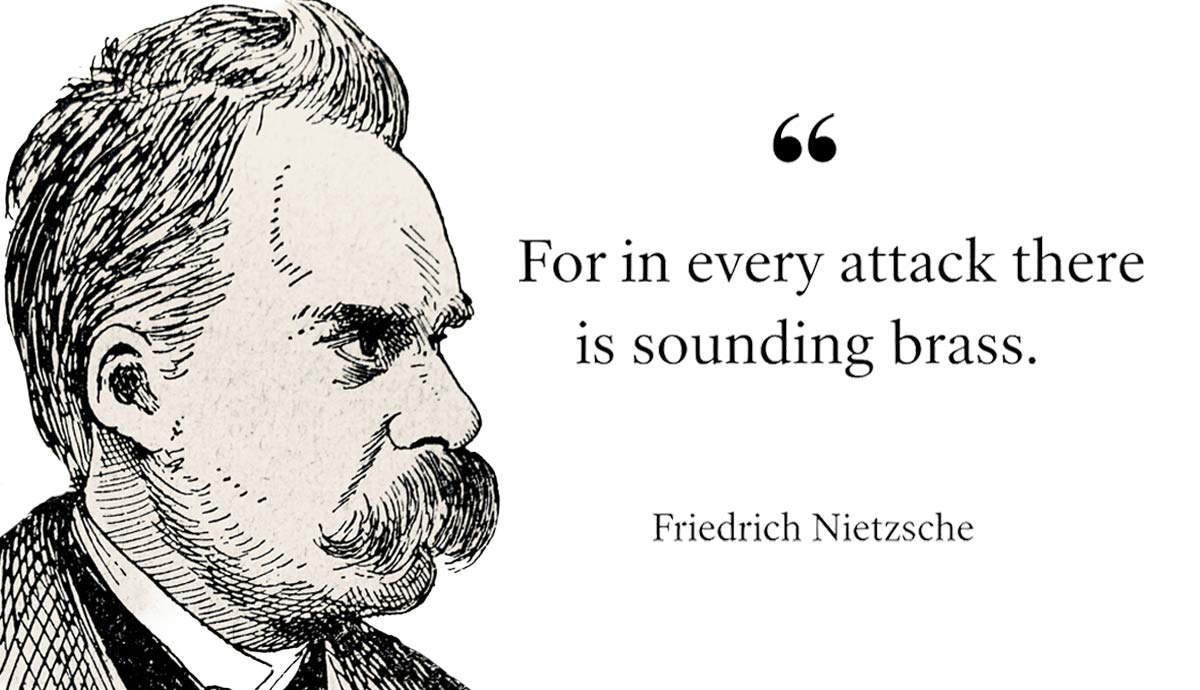
Friedrich Nietzsche challenged inherited morality and asked what gives life value. He wrote in pointed aphorisms that still shape debates about meaning, art, and the self.
This article explains five of his most cited lines. For each, you will see what it means, where it appears, and why it remains relevant today.
1. “God Is Dead, and We Have Killed Him.”

The statement “God is dead, and we have killed him” epitomizes Friedrich Nietzsche. This phrase encapsulates his thoughts on traditional religion, which has been eroded in the Western world. This is not a literal death; instead, it refers to the loss of faith in an all-powerful deity that provides humans with a universal objective meaning and reason for existence.
He believed that moral values created from religious doctrine constrict potential and hinder personal development. Leaving faith behind would, therefore, bring on a crisis over identity and values.
What if there is no divine guidebook left? Nietzsche argued that humans must create their own meaning through individual, subjective experiences. His “will to power” theory addresses this, which is concerned with self-assertion and striving for personal goals rather than relying on external moral yardsticks.
Instead, he believes, people should affirm their own creative abilities and invent their own values and purpose to steer this existential vacuity.
2. “That Which Does Not Kill Us Makes Us Stronger.”

The quote, “that which does not kill us makes us stronger,” is a powerful encapsulation of Friedrich Nietzsche’s concept of the human spirit. According to Nietzsche, difficulties and obstacles are not merely things to be endured; they can also be opportunities for growth and self-overcoming. This quote aligns with a broader theme in Nietzsche’s writing: the concept of life-affirmation.
Nietzsche believed that only by pushing against one’s limits, by struggling with something difficult, can one develop inner strength or reach their potential. Setbacks can be turned into practice for resilience, clarity, and self-command.
In this view, strength is not only physical; it encompasses more than just physical strength. It includes the courage to face loss, failure, or rejection without retreat. Growth comes from testing oneself, then choosing how to respond. The line encourages readers to treat pain as raw material for character rather than as a final verdict.
3. “Without Music, Life Would Be a Mistake.”

This quote succinctly captures Friedrich Nietzsche’s deep reverence for the arts and his conviction that they play a crucial role in human existence. Nietzsche regarded music as a profound expression of the human spirit and a source of transcendent experiences. In Nietzsche’s philosophy, art was not mere indulgence or entertainment but fundamental to living.
Music was significant for Nietzsche because it could communicate directly to the heart, bypassing reason and language. Certain pieces summon powerful moods that words cannot secure. In this way, music reveals intensities of life that argument alone cannot reach.
For Nietzsche, such experiences do not distract from truth. They disclose it in another register. The value of music is therefore practical as well as poetic. It restores vitality, affirms feeling, and reminds listeners that meaning can be made, not only explained.
4. “In Heaven, All the Interesting People Are Missing.”

Nietzsche rejected the belief in a life after death as escapism from living truly in this world. On the other hand, he upheld pursuing passions, creativity, and finding fulfillment here on earth. In fact, he further generalizes that “all the interesting people are missing.” Hence, those who seek heavenly rewards often lack the opportunity to engage with life in a meaningful way.
The point is not a tally of persons but a challenge to priorities. If energy is spent on deferred rewards, less remains for experiment, creation, and risk in the present. Nietzsche urges readers to cultivate excellence now, to prefer a vivid life to safe promises.
Interest follows from activity and courage. It thrives where people embrace challenges, build things, and push themselves. The quote encourages readers to focus on earthly significance rather than posthumous consolation.
5. “Invisible Threads Are the Strongest Ties.”

In stark contrast to the superficiality that social conventions brought into play, he advocated for genuine relations, which blossom out of a genuine desire for understanding and connection.
When Nietzsche spoke of “invisible threads” holding people together, he referred to those intangible qualities that make connections between people real ones, shared perspectives or emotional responses,and intellectual congruence.
For example, consider a close friendship or romantic relationship. They can move miles apart under any circumstances. However, they still feel connected. The same goes for communities organized around shared hobbies or interests.
Nietzsche believed that being authentic with others, being oneself rather than trying to be what one thinks society expects, was essential for genuine relationships. Such ties are durable because they rest on mutual recognition and trust. The strongest bonds are often the least performative and the most felt.
So What Does Friedrich Nietzsche Teach Us?

Friedrich Nietzsche’s work offers practical lessons for living. He emphasizes growth, freedom, and fidelity to the self. He urges readers to question inherited religion and morality so they can create their own values, rather than being guided by an afterlife or a higher power.
In Nietzsche’s view, adversity can strengthen character and expand capacity. Instead of fleeing difficulty, individuals can use it as material for self-creation.
Art, especially music, conveys truths and emotions that logic and language do not capture. It restores vitality and creates a shared register of feeling.
Real relationships are built on emotional connection, shared values, and understanding, rather than money or appearance. Such bonds endure because they are grounded in mutual recognition and trust.
Above all, Nietzsche turns attention to the present. Rather than deferring meaning to future rewards, people should live fully in the present by pursuing what they truly want and acting with authenticity, rather than conformity.









